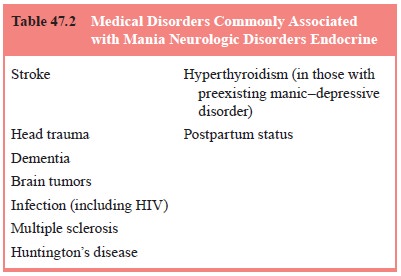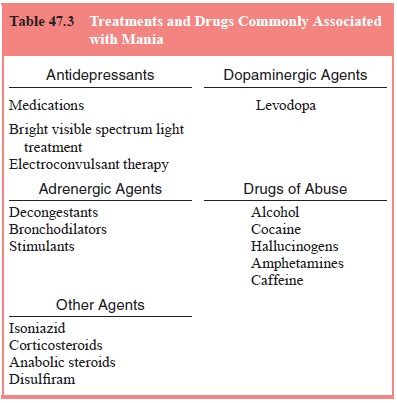Chapter: Essentials of Psychiatry: Mood Disorders: Bipolar (Manic–Depressive) Disorders
Bipolar (Manic–Depressive) Disorders: History, Physical Examination and Laboratory Studies
History, Physical Examination and Laboratory Studies
Although the diagnosis of manic–depressive disorder is made on the basis
of phenomenology, there are several reasons to con-duct a thorough medical
history and physical examination. First, there are several general medical or
substance-related causes of manic depression that, if treated, may lead to the
resolution of the mood episode. Similarly, mania may be the first sign of a
general medical illness that will be progressive and serious in its own right.
Secondly, medical evaluation is necessary before starting medications used in
the treatment of manic–depressive disorder. Finally, for many patients with
psychiatric illnesses, particularly chronic or severe illnesses, their first
contact with medical care as an adult is during the psychiatric interview,
often under inpa-tient or even involuntary conditions. Because psychiatric
illness is clearly not protective
against medical illnesses, and since even common general medical illnesses may
never have been screened for in the past, a thorough medical history and
physical examina-tion are necessary parts of the basic care of patients.
The overall approach to evaluating persons with manic– depressive
disorder for medical problems may be generalized asfollows: persons with psychiatric
disorders, including manic– depressive disorder, should have regular screening
for disease detection and health maintenance purposes as recommended for the
general population. However, it should also be kept in mind that individuals
with manic–depressive disorder, by virtue of having an often severe and
disabling behavioral disorder, are less likely than the general population to
have had adequate medical screening and treatment. Thus, special care must be
made to en-sure that health problems are not overlooked and that appropriate
treatment or referral is effected. Unfortunately, it is the exception rather
than the rule to have well-integrated medical and mental health systems so that
the mental health provider can assume that some effort will need to be expended
to ensure adequate care is delivered for individuals with manic–depressive
disorder.
Which general medical illnesses may cause symptoms of manic–depressive
disorder? Most medical illnesses that affect brain function have been described
in case reports or small case series to cause one or another psychiatric
syndrome. Several gen-eral medical illnesses have been associated with the
development of manic–depressive disorder (Table 47.2) although none can be
considered specific risk factors. Administration of medications has been
observed frequently in clinical practice to be associated with the onset of
mania, particularly in patients with preexisting depression. Such medications
are listed in Table 47.3.


Some controversies have been hotly debated, particularly regarding the
role of antidepressants in causing mania and rapid cycling. Of particular
importance to psychiatric practice, all ef-ficacious antidepressant treatments
have been suspected to cause the induction of mania, with the exception of
lithium and the pos-sible exception of psychotherapy. This caveat for
antidepressants also includes nonpharmacological antidepressants such as light
and electroconvulsive therapy (ECT). The latter effect is para-doxical, as ECT
is also used successfully to treat mania
Related Topics